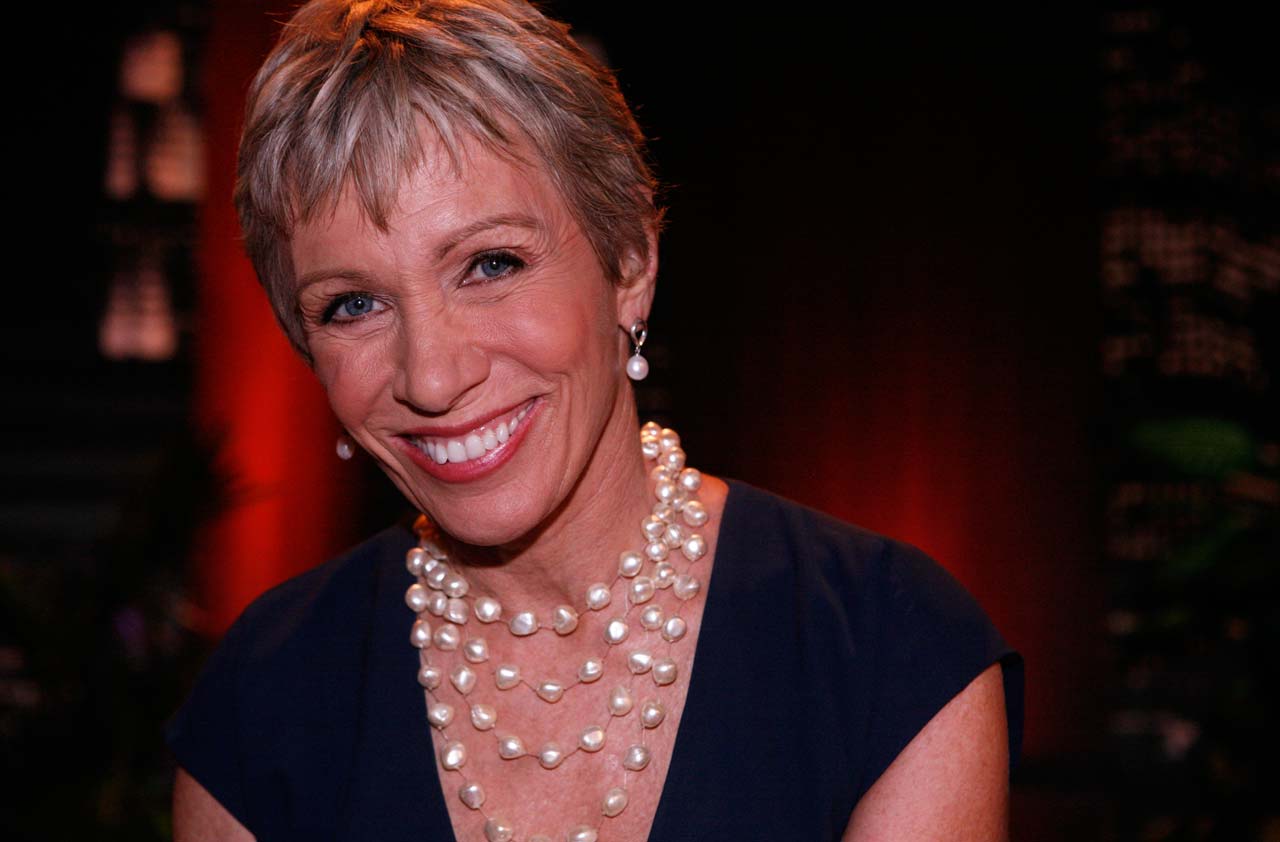Shark Tank's Barbara Corcoran to Entrepreneurs: Enough With the 'Fancy Talk'
The successful businesswoman offers advice on turning fledgling ideas into winning businesses.


Profit and prosper with the best of Kiplinger's advice on investing, taxes, retirement, personal finance and much more. Delivered daily. Enter your email in the box and click Sign Me Up.
You are now subscribed
Your newsletter sign-up was successful
Want to add more newsletters?

Delivered daily
Kiplinger Today
Profit and prosper with the best of Kiplinger's advice on investing, taxes, retirement, personal finance and much more delivered daily. Smart money moves start here.

Sent five days a week
Kiplinger A Step Ahead
Get practical help to make better financial decisions in your everyday life, from spending to savings on top deals.

Delivered daily
Kiplinger Closing Bell
Get today's biggest financial and investing headlines delivered to your inbox every day the U.S. stock market is open.

Sent twice a week
Kiplinger Adviser Intel
Financial pros across the country share best practices and fresh tactics to preserve and grow your wealth.

Delivered weekly
Kiplinger Tax Tips
Trim your federal and state tax bills with practical tax-planning and tax-cutting strategies.

Sent twice a week
Kiplinger Retirement Tips
Your twice-a-week guide to planning and enjoying a financially secure and richly rewarding retirement

Sent bimonthly.
Kiplinger Adviser Angle
Insights for advisers, wealth managers and other financial professionals.

Sent twice a week
Kiplinger Investing Weekly
Your twice-a-week roundup of promising stocks, funds, companies and industries you should consider, ones you should avoid, and why.

Sent weekly for six weeks
Kiplinger Invest for Retirement
Your step-by-step six-part series on how to invest for retirement, from devising a successful strategy to exactly which investments to choose.
Unlike other prominent entrepreneurs who made it big before graduating college, Barbara Corcoran (pictured at left) found great success later in her career. In 2001, she sold her New York-based real estate firm the Corcoran Group for $66 million after 28 years at the helm. Since then, Corcoran has gone on to make an even bigger name for herself in the business world and beyond. She is a regular real estate contributor on NBC's "Today" show, has written several books and is currently a panelist on ABC's reality TV competition series "Shark Tank."
See Our Slide Show: 6 Millionaire Moms
Kiplinger.com spoke with Corcoran about how taking risks early-on in her career proved beneficial, what makes a new start-up stand out, as well as her unusual approach to maintaining wealth. Here are edited excerpts from our interview:
What's one key piece of advice you'd give to a budding entrepreneur?
From just $107.88 $24.99 for Kiplinger Personal Finance
Become a smarter, better informed investor. Subscribe from just $107.88 $24.99, plus get up to 4 Special Issues

Sign up for Kiplinger’s Free Newsletters
Profit and prosper with the best of expert advice on investing, taxes, retirement, personal finance and more - straight to your e-mail.
Profit and prosper with the best of expert advice - straight to your e-mail.
Don't waste time thinking about it. One of the biggest problems many entrepreneurs have is they spend too much time thinking about the process. They think they have to get a patent first or hire a PR firm right away -- what a waste of time.
I can't remember who said it, but there's an old saying: 'You don’t have to get it right, you just have to get it going.' All you need to do is get a prototype, walk out there and see if anyone will buy your product.
Looking back at your professional journey, when did you realize you were on the path to becoming wealthy?
I can't say that I ever had that exact thought. I do remember, though, the moment when I thought I could actually "make it." It was 1985 -- about 16 years into my career. I ordered new cars for both of my parents and had them delivered to their retirement home in Florida. Growing up we always had clunker cars. I got my dad a beige Lincoln Town Car and bought my mom a blue Pontiac convertible. That was and probably still is the most thrilling moment for me, because I had the power to do that for them.
What's the biggest risk you took?
I never really thought about the risk. For me, it was more about the excitement of taking a shot at it. I remember in 1979, the market was doing horribly. I decided to plunk down a ton of money to rent out an entire floor of a building on Madison Avenue [in New York City]. It was a gut renovation and we built it to look like a state of the art spa with luxury finishes. Given the way the market was at the time, I had no business doing that. In my heart, I felt that if I took that plunge it would work out and it did.
What's the one thing you would have done differently?
I would've had a baby sooner. I had my first child at age 46. Becoming a mother is the most satisfying work I’ve done. When it comes to work/life balance, there is no such thing as balance. If you're a mom, you're a mom 150%. If you're a mom and you have a business that you're serious about, it's the same thing. Something eventually has to give and it will most likely be you. You'll always feel like you're on "E."
What are you doing to make your wealth last other than invest in new ventures on "Shark Tank"?
My personal goal is simple: to not lose the money I have until I'm dead. My unsophisticated plan is taking a $1 million profit from the stock market -- which doesn't necessarily happen every year -- and buying old lady bonds with it that return a very low tax-free return. Just doing that allows me to keep up my standard of living. I don't want to lose a lot of money or make a lot of money, just keep up my happy standard of living.
What are the key factors that make a "Shark Tank" pitch a winner to you?
For me, it's never the pitch -- it's about the entrepreneur. I look for someone who's really good at taking the pressure of a shark attack. If they can handle that, it lets me know they can probably handle all of the other pressures that come with a start-up. I look for someone who is good under pressure and can pop back in the face of adversity.
Also, I'll go for someone who has high energy over someone with a high IQ every time. I like people who cut to the chase and can get to the point -- not just in the pitch, but in the answers, too.
Read our profile on one of the companies Corcoran has invested in on "Shark Tank": Small Business Success Story: Daisy Cakes.
What are the show-stoppers that turn off your interest immediately?
Too much fancy talk -- someone who uses those Harvard MBA-type words all the time. To me, that guy will never make money. Too much education can build false confidence. When you build a business, you need to relate to everyday people. Those are the folks you'll need to help build your business. You have to talk their talk and get them to buy-in and follow you. The guys who talk fancy distance themselves from people and typically lack the ability to see what's really going wrong, because no one tells them -- and they wouldn't listen anyway.
Another thing that bugs me is when a person has no regrets about blowing their parents' money on their business idea or no sense of urgency to pay them back. That says to me that you'll have no qualms about blowing my money, too.
If you were starting out today, which industry would you choose other than real estate?
I would start an advertising agency or a public relations firm. It speaks to my strengths. I'm a great communicator and educator. Both fields require you to use your imagination to create magic and drive sales. That's what I do best and my talent would have applied well to both of those businesses.
How do you give back to the community?
I take care of my family first. I've been putting my college-age relatives through college for some time. I even set up a trust fund for it. I've sent 23 kids to college in total. That's my main focus, but I also mentor young people in business and help various charities geared towards dyslexia.
Profit and prosper with the best of Kiplinger's advice on investing, taxes, retirement, personal finance and much more. Delivered daily. Enter your email in the box and click Sign Me Up.

Browne Taylor joined Kiplinger in 2011 and was a channel editor for Kiplinger.com covering living and family finance topics. She previously worked at the Washington Post as a Web producer in the Style section and prior to that covered the Jobs, Cars and Real Estate sections. She earned a BA in journalism from Howard University in Washington, D.C. She is Director of Member Services, at the National Association of Home Builders.
-
 Stocks Sink With Alphabet, Bitcoin: Stock Market Today
Stocks Sink With Alphabet, Bitcoin: Stock Market TodayA dismal round of jobs data did little to lift sentiment on Thursday.
-
 Betting on Super Bowl 2026? New IRS Tax Changes Could Cost You
Betting on Super Bowl 2026? New IRS Tax Changes Could Cost YouTaxable Income When Super Bowl LX hype fades, some fans may be surprised to learn that sports betting tax rules have shifted.
-
 How Much It Costs to Host a Super Bowl Party in 2026
How Much It Costs to Host a Super Bowl Party in 2026Hosting a Super Bowl party in 2026 could cost you. Here's a breakdown of food, drink and entertainment costs — plus ways to save.
-
 9 Types of Insurance You Probably Don't Need
9 Types of Insurance You Probably Don't NeedFinancial Planning If you're paying for these types of insurance, you may be wasting your money. Here's what you need to know.
-
 My Four Pieces of Advice for Women Anxious About Handling Money
My Four Pieces of Advice for Women Anxious About Handling MoneyTalking about money can help you take control of your finances.
-
 What You Learn Becoming Your Mother's Financial Caregiver
What You Learn Becoming Your Mother's Financial CaregiverWriter and certified financial planner Beth Pinsker talks to Kiplinger about caring for her mother and her new book.
-
 Amazon Resale: Where Amazon Prime Returns Become Your Online Bargains
Amazon Resale: Where Amazon Prime Returns Become Your Online BargainsFeature Amazon Resale products may have some imperfections, but that often leads to wildly discounted prices.
-
 How Women Can Turn a Gray Divorce Into a Financial Win
How Women Can Turn a Gray Divorce Into a Financial WinGetting divorced later in life can be a big financial blow, especially for women. But, as this financial adviser points out, it can also serve as a positive turning point for growth and independence.
-
 Roth IRA Contribution Limits for 2026
Roth IRA Contribution Limits for 2026Roth IRAs Roth IRAs allow you to save for retirement with after-tax dollars while you're working, and then withdraw those contributions and earnings tax-free when you retire. Here's a look at 2026 limits and income-based phaseouts.
-
 How to Search For Foreclosures Near You: Best Websites for Listings
How to Search For Foreclosures Near You: Best Websites for ListingsMaking Your Money Last Searching for a foreclosed home? These top-rated foreclosure websites — including free, paid and government options — can help you find listings near you.
-
 Four Tips for Renting Out Your Home on Airbnb
Four Tips for Renting Out Your Home on Airbnbreal estate Here's what you should know before listing your home on Airbnb.